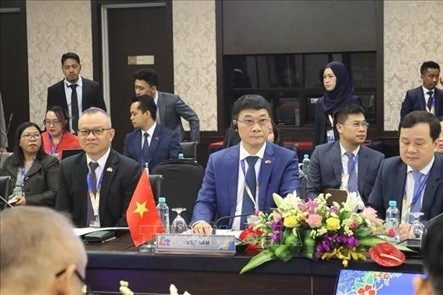Employment program needs to respond to Industrial Revolution 4.0
Policies on labor and employment in line with the 4th Industrial Revolution topped the agenda of a recent conference in Hanoi to review 10 years of implementing State employment management.

Over the past decade, the Law on Employment, together with projects on employment, vocational education, labor safety, support for women and young people, and job creation loans, has provided jobs for 1.6 million people a year.
To date, more than 55 million workers nationwide have been employed, up 6 million compared to 2008.
Currently more than 80,000 foreigners from 110 countries and territories are working in Vietnam, 95 per cent of them licensed.
For 10 years, international cooperation has created jobs through an EU-funded labor market project and the ILO-Japan Program to promote unemployment insurance and employment services in ASEAN.
Le Quang Trung, Deputy Director of the Deparment of Employment, said: “From 2008 to 2017, 63 employment service centers under the Ministry of Labor, Invalids, and Social Affairs have provided consultancy and jobs for more than 18 million people.
96 per cent of beneficiaries with unemployment allowances have been introduced jobs and more than 123,000 workers are getting unemployment allowances.”
Vietnam has an abundant labor force but the quality remains low and the scale of businesses is small. Only 4 per cent of domestic enterprises have 30 or more employees.
Deputy Minister of Labor, Invalids, and Social Affairs Doan Mau Diep said that to create stable jobs, especially during industrial revolution 4.0, State employment management should match Vietnam’s growth and international integration.
“To integrate well into the 4th Industrial Revolution, it’s necessary to improve labor market management. This will require a great effort by the Ministry of Labor, Invalids, and Social Affairs, which should promptly fine-tune the laws on labor and employment in line with current international practice,” Diep said./.
VNF/VNA
Recommended
 National
National
Vietnam News Today (Jun. 2): Vietnamese Trade Mission Sounds Out Business Opportunities in United States
 National
National
Vietnam News Today (Jun. 1): Vietnamese, Japanese Firms Foster Partnership
 National
National
Vietnam News Today (May 31): Vietnam Strongly Supports Laos’s National Development
 National
National
Vietnam News Today (May 30): Vietnam, Venezuela Reinforce Ties Through People-to-people Diplomacy
 National
National
Vietnam News Today (May 29): Vietnam and Hungary to Expand Cooperation into New Areas
 National
National
Vietnam News Today (May 28): Vietnam and China Discuss Strategic Cooperation Orientations
 National
National
Vietnam News Today (May 27): Vietnam Treasures Multifaceted Collaboration with France
 National
National
